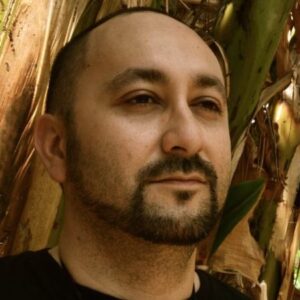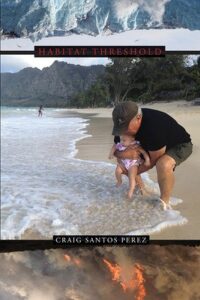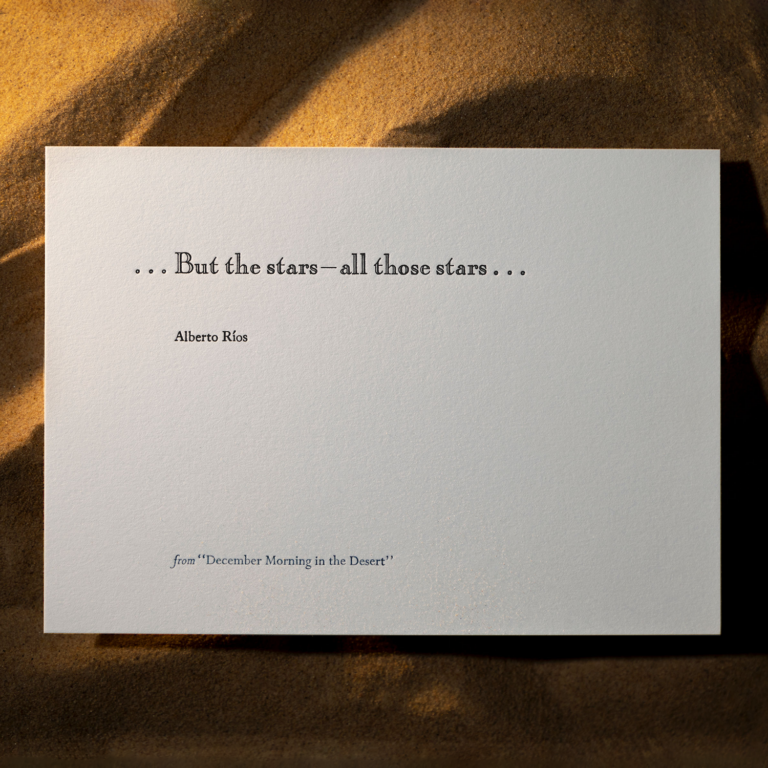Craig Santos Perez
Rings of Fire
What if the planet were as loved as a child? Taking the story of his daughter’s fever when she was one, Craig Santos Perez reflects on everything he did — and would have done — for his daughter’s health. Her temperature rose and his love and response did, too. The temperature of the world rises, and he wonders who loves the earth enough to respond, and who doesn’t.

Letterpress prints by Myrna Keliher | Photography by Lucero Torres
Guest

Craig Santos Perez is an indigenous Chamoru (Chamorro) from the Pacific Island of Guåhan (Guam). He is a poet, scholar, editor, publisher, essayist, critic, book reviewer, artist, environmentalist, and political activist. Craig is the author of two spoken word poetry albums, Undercurrent and Crosscurrent, and five books of poetry: from unincorporated territory [hacha], from unincorporated territory [saina], from unincorporated territory [guma’], from unincorporated territory [lukao], and, most recently, Habitat Threshold.
Transcript
[music: “Praise the Rain” by Gautam Srikishan]
Pádraig Ó Tuama: My name is Pádraig Ó Tuama, and in the last few days, there’s been a few things that have gotten me down a bit. Somebody that I know is ill, and then I got news that a poetry thing I’d applied for, I hadn’t been successful in getting it. And in the context of all of this I turn to poetry, because, over and over again, it’s the creativity at the heart of poetry that alerts me to the question of what does it mean to nurture the heart with enough creativity and the excitement of language and something that sets me alight? What does it mean to do that in order to bring myself, with energy and hope and not a kind of an overwhelming sense of despair, to questions about how I can be, in the world around me?
[music: “Praise the Rain” by Gautam Srikishan]
“Rings of Fire,” by Craig Santos Perez:
“Honolulu, Hawaii
We host our daughter’s first birthday party
during the hottest April in history.
Outside, my dad grills meat over charcoal;
inside, my mom steams rice and roasts
vegetables. They’ve traveled from California,
where drought carves trees into tinder—‘Paradise
is burning.’ When our daughter’s first fever spiked,
the doctor said, ‘It’s a sign she’s fighting infection.’
Bloodshed surges with global temperatures,
which know no borders. ‘If her fever doesn’t break,’
the doctor continued, ‘take her to the Emergency
Room.’ Airstrikes detonate hospitals
in Yemen, Iraq, Afghanistan, South Sudan . . .
‘When she crowned,’ my wife said, ‘it felt like rings
of fire.’ Volcanoes erupt along Pacific fault lines;
sweltering heatwaves scorch Australia;
forests in Indonesia are razed for palm oil plantations—
their ashes flock, like ghost birds, to our distant
rib cages. Still, I crave an unfiltered cigarette,
even though I quit years ago, and my breath
no longer smells like my grandpa’s overflowing ashtray—
his parched cough still punctures the black lungs
of cancer and denial. ‘If she struggles to breathe,’
the doctor advised, ‘give her an asthma inhaler.’
But tonight we sing, ‘Happy Birthday,’ and blow
out the candles together. Smoke trembles
as if we all exhaled
the same flammable wish.”
[music: “Svela Tal” by Blue Dot Sessions]
So the first thing that came to my mind when I read this poem was how brilliantly it goes back and forth between something that’s happening at a child’s birthday party and then that child’s arrival in the world and that child’s precarious health situation, with having had fever, and looking at the rising temperatures around the world, looking at all kinds of different locations, through the lens of that child. And going back and forth between the global setting of the poem and then the tiny setting of the poem for this small child, I thought, was a very clever piece of irony, a very interesting lens, really, through which to look at the question of climate change in the world.
This is a classic ecopoem. An ecopoem is a poem about nature that is looking at the question of the environment and also looking at the question of environmentalism. What does it mean to pay attention to what’s going on, to be alert to what’s going on, not just for the sake of describing something beautiful, but, in a certain sense, of trying through the art of the poem to get the attention of people — in order, hopefully, that they will pay attention, through the poem, to something bigger than the poem, i.e., the question of human habitation on this planet.
[music: “Lesser Gods of Metal” by Blue Dot Sessions]
So Craig Santos Perez is a native Chamoru from Mongmong, in Guam. He lives in Hawai‘i now, and he teaches at the University of Hawai‘i, and he teaches ecopoetry and creative writing and Pacific literature. Being located in Hawai‘i, a beautiful place, an island meeting place of fire, air, and water, it’s an elemental place
This poem has a setting that’s local, a child’s first birthday party in Hawai‘i, and the poet’s parents have flown over from California to be there for part of it. There’s a real domestic scene; you know, the father’s grilling, the mother’s roasting vegetables. Then there’s the words from his wife, where she speaks about having given birth to this child a year beforehand and saying that when she’d crowned, it had felt like rings of fire
And the daughter’s temperature spikes. In a certain sense, Craig Santos Perez is highlighting the fact that the whole world is his daughter, and his daughter is the whole world. And that, I think, is a really interesting poetic technique, to find a way where he is — through love, through adoration of his child, through the reality that she will live longer than he will, and through the reality that he wishes her to have a world that’s safe and where fever isn’t spiking globally — he is locating us in his love for his daughter and his love for his broader family and hoping that the combination of looking at the whole world through the lens of a love of a parent for their one-year-old daughter might be a way where the question about environmental disaster and rising temperatures can be considered in a new light, perhaps particularly for those who don’t wish to pay attention to that.
And I think one of the things that this poem is doing is saying that if the Earth were your child, how would you care for that child with love? He doesn’t wrap this poem up neatly at the end to say it’ll all be fine, but nor does he wrap up this poem uncomfortably in the end to say, Abandon hope, all you who read this poem. He is holding together a precarity and, deeper than that, I think, a profound love, in the hope that there can be a gathering together for doing something serious and long-lasting in order to ensure a future for his love, as well as for the love that he and his spouse have for their daughter.
[music: “Dropped Ticket” by Blue Dot Sessions]
There’s a pivot that’s really worthwhile mentioning in this poem. Inasmuch as we’re thinking of the worry about this child and her first fever — you know, the doctor said that her fever was a sign she’s fighting infection — he’s holding up the Earth and the global temperature rising almost like the Earth, too, is fighting infection.
And then, with affection but also critique, he mentions his grandfather — his grandfather’s “overflowing ashtray.” And he speaks about that man’s “parched cough still punctures the black lungs / of cancer and denial.” And he’s critiquing the question to say, You’re living with something that’s killing you, and you’re in denial of that fact. Through the lens of his family, people who he loves, he’s wanting to say, We need our love to do better. We need to make serious changes in order to do better.
[music: “Ashed to Air” by Gautam Srikishan]
So often, in poetry, what you’re looking for is that the poem can hold its own kind of tension. It’s like if you’re tying a knot. You need the knot to not be too tight, but also not too loose. And so poetry in a certain sense is a kind of a knot with words. And over and over again in this poem, what Craig Santos Perez does is to raise the stakes of the question of environmental change, as well as then raise the stakes about, is your daughter going to be OK? Back and forth, we go from forest fires around the world and ash raining down and then back to the question about his child, and the birthday party, blowing out candles. And then he’s wishing he could have a smoke, having decided to give up, and then back again to the question of the environmental change. And so there’s this tension between the individual and the global.
Time and place are everywhere, throughout this poem. The poem is set in Honolulu, in Hawai‘i, and then his parents have traveled from California. There’s hospital, and then there’s all these other places around the world mentioned — Yemen, Iraq, Afghanistan, South Sudan, and Pacific fault lines, and Australia and Indonesia. And he’s pairing together places that have become synonymous, in the last 10 years, with questions to do with war, for people. But by pairing those together with other places where people maybe don’t associate war, he’s saying all of this might, in the future — and might even in the present — be places where climate emergencies are exacerbating conflict.
And then there’s time, as well. He’s saying it’s a year since his daughter was born, and it’s the hottest April in history, and it’s the time of forest fires in California. And by holding together place and time, I think he is wanting to hold together an ethic about what does it mean to be in the here and now? There’s nothing abstract in his poem. There’s nothing ideological, even. There is evidence, and there is the question of how is this world going to continue, and there is the undergirding presence of love, throughout this poem. And so I think, in partnership with time and place, he is hoping that love and some kind of cooperation between individuals as well as large-scale governments and corporations, can be enough to sustain time and place.
[music: “Every Place We’ve Been” by Gautam Srikishan]
“Rings of Fire,” by Craig Santos Perez:
“Honolulu, Hawaii
We host our daughter’s first birthday party
during the hottest April in history.
Outside, my dad grills meat over charcoal;
inside, my mom steams rice and roasts
vegetables. They’ve traveled from California,
where drought carves trees into tinder—‘Paradise
is burning.’ When our daughter’s first fever spiked,
the doctor said, ‘It’s a sign she’s fighting infection.’
Bloodshed surges with global temperatures,
which know no borders. ‘If her fever doesn’t break,’
the doctor continued, ‘take her to the Emergency
Room.’ Airstrikes detonate hospitals
in Yemen, Iraq, Afghanistan, South Sudan . . .
‘When she crowned,’ my wife said, ‘it felt like rings
of fire.’ Volcanoes erupt along Pacific fault lines;
sweltering heatwaves scorch Australia;
forests in Indonesia are razed for palm oil plantations—
their ashes flock, like ghost birds, to our distant
rib cages. Still, I crave an unfiltered cigarette,
even though I quit years ago, and my breath
no longer smells like my grandpa’s overflowing ashtray—
his parched cough still punctures the black lungs
of cancer and denial. ‘If she struggles to breathe,’
the doctor advised, ‘give her an asthma inhaler.’
But tonight we sing, ‘Happy Birthday,’ and blow
out the candles together. Smoke trembles
as if we all exhaled
the same flammable wish.”
[music: “Praise the Rain” by Gautam Srikishan]
Chris Heagle: Thank you to Craig Santos Perez, who gave us permission to use his poem “Rings of Fire,” from the book Habitat Threshold. Read the poem on our website, at onbeing.org.
[music: “Praise the Rain” by Gautam Srikishan]
Poetry Unbound is: Gautam Srikishan, Erin Colasacco, Eddie Gonzalez, Lilian Vo, and me, Chris Heagle.
Our music is composed and provided by Gautam Srikishan and Blue Dot Sessions.
This podcast is produced by On Being Studios, which is located on Dakota land. We also produce other podcasts you might enjoy, like On Being with Krista Tippett, Becoming Wise, and This Movie Changed Me. Find those wherever you like to listen, or visit us at onbeing.org to find out more.
Books & Music
Recommended Reading
The On Being Project is an affiliate partner of Bookshop.org and Amazon.com. Any earnings we receive through these affiliate partnerships go into directly supporting The On Being Project.









Reflections